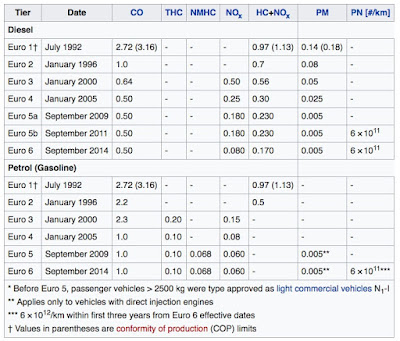For example, the the last couple of times I changed my car, I always chose a car with better mpg. Currently I've got a Vauxhall Mokka which is averaging about 57, which is significantly better than the Ford Focus I had before. Both are diesel engined (this becomes important later), but the Mokka has stop/start that means it doesn't just sit ticking over in queues. Obviously, I'd prefer an electric vehicle, but at the time of changing, max range was a little over 100 miles, and journeys need careful planning. Can't afford a PHEV yet, but things are changing fast in that area.
Recently, there has been a lot of concern about air quality and pollution, especially in cities. That has pointed the finger at diesel engines, which are responsible for more particulates and nitrogen oxide (NOX) pollution than petrol engines.
You can see my problem. Having chosen a car that does more mpg, and emits less CO2, am I now responsible for other damage?
I can't resist looking at the technical stuff, so I thought I'd look at the emissions standards, which are controlled via EU regulations, which have progressively become tighter. My old car had a Euro 5 engine, which undoubtedly put out more NOX than an equivalent petrol engine. What was interesting was to see what the Euro 6 specification looked like.
As you can see in the table from Wikipedia below, the requirement for diesels is 0.08 g/km, down from 0.18, and for petrol it's 0.06 g/km, so the gap has significantly narrowed.
THC & HC = hydrocarbon. NMHC = non-methane hydrocarbon PM = particulate matter
It seems pretty clear to me that the problem lies with the older diesels that are still on our roads (and diesel engines tend to last). It may be that I will end up at the rough end of some blanket measures to discourage diesel, and that's fair enough. However, I hope some thought might go into how current owners of older more polluting models might be helped to modernise and upgrade, so that the vehicles doing the most damage are removed from our roads more quickly.
I can't resist looking at the technical stuff, so I thought I'd look at the emissions standards, which are controlled via EU regulations, which have progressively become tighter. My old car had a Euro 5 engine, which undoubtedly put out more NOX than an equivalent petrol engine. What was interesting was to see what the Euro 6 specification looked like.
As you can see in the table from Wikipedia below, the requirement for diesels is 0.08 g/km, down from 0.18, and for petrol it's 0.06 g/km, so the gap has significantly narrowed.
THC & HC = hydrocarbon. NMHC = non-methane hydrocarbon PM = particulate matter
It seems pretty clear to me that the problem lies with the older diesels that are still on our roads (and diesel engines tend to last). It may be that I will end up at the rough end of some blanket measures to discourage diesel, and that's fair enough. However, I hope some thought might go into how current owners of older more polluting models might be helped to modernise and upgrade, so that the vehicles doing the most damage are removed from our roads more quickly.

No comments:
Post a Comment